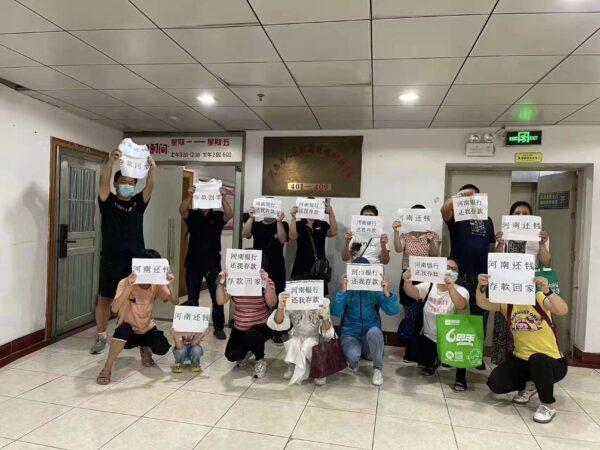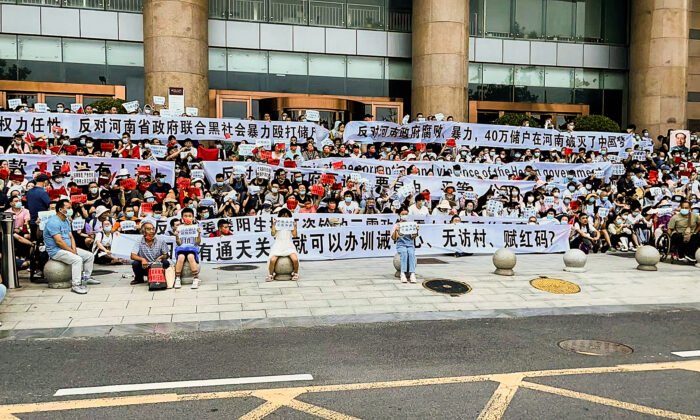Temporary Solution to Looming Financial Crisis: China Merges Small Banks with Larger Ones
The Chinese authorities are currently accelerating the consolidation and merger of small and medium-sized financial institutions in an attempt to mitigate the impact of a potential financial crisis.
An analyst pointed out that if the bank failure continues, the interests of a large number of people will be jeopardized and they will demand compensation for their losses, which will definitely affect the stability of the Chinese Communist regime.
Among eight key tasks laid out by China’s Financial Supervisory Authority (FSA) in its 2024 working meeting, the so-called reform of small and medium-sized financial institutions to resolve risks stands out as a primary goal.
“Risk mitigation for small and medium-sized banks often entails mergers, reorganizations, or uniting efforts,” Liu Xiaochun, deputy director of the Shanghai Institute for Financial Research, a think tank, said at an internal strategy meeting in November 2023.
So far, according to official data, there are 3,912 small and medium-sized banks in China—mainly city commercial banks, rural credit unions, and village banks with total assets of 110 trillion yuan (about $15.45 trillion), accounting for 28 percent of total bank assets in the country.
As of the end of June 2023, the number of village banks in China was 1,642, accounting for 40.38 percent of the total number of banking institutions in China.
Since 2022, merger or consolidation the shareholding structure of more than 500 small banks has taken place in at least seven provinces, affecting 2,100 rural financial institutions, with an asset size of $6.7 trillion.
Bank Failures
In April 2022, several village banks in Henan Province stopped customers from withdrawing money. Since then, there have been multiple bank failure incidents involving village banks across China.
The authorities’ main method of resolution is to have the small banks absorbed and consolidated by large banks with direct or indirect equity participation. It is estimated that in 2023 alone, nearly 100 of small and medium-sized banks went through consolidation and merger.
Lu Yuanxing, U.S.-based political and economic analyst who is a former corporate executive in China, believes that with the collapse of China’s real estate sector and its continued decline this year, more and more banks will encounter crises or bank failure.
In an interview with The Epoch Times on Feb. 11, Mr. Lu said, “As property prices continue to fall in 2024, more and more bank loans will become non-performing, and these banks will run into bank failure problems.
“After the merger of small banks with large banks, the total debt has not been reduced, but the merger has only delayed the time of bank failure. Although the big banks have relatively more assets, with the collapse of the real estate industry, they are having trouble protecting themselves,” he said.
China’s real estate sector has been in decline since 2021, with corporate giants such as Evergrande and Country Garden defaulting on their debts one after another.
According to China Housing News, about 233 real estate companies in China declared bankruptcy in 2023. Statistics show that more than 1,200 real estate companies have gone bankrupt in the four-year period from 2020 to 2023.
Economist Xu Chenggang said in a recent interview that a large portion of loans in the financial sector are backed by real estate assets. As the real estate market trends downward, the value of assets on the balance sheets of banks, which are collateralized by real estate, decreases. Therefore, when assets diminish in value, it jeopardizes the bank’s balance sheet, risking bank insolvency. The failure of one bank can set off a chain reaction, culminating in a financial crisis.
“Such a crisis is not caused by any individual, but by the communist system,” Mr. Xu explained.
A Bank Failure Victim
On April 18, 2022, several village banks experienced a funding crisis and completely stopped allowing customers to withdraw their funds. About 400,000 customers were affected, and their combined savings in these banks were at least tens of billions of yuan (one dollar is equal to 7.12 yuan).
These incidents caused panic among customers, who continued to organize large-scale demonstrations and protests, which were severely suppressed by the authorities.
Wang Qi, a customer in Henan who suffered from the failure of a small bank, still has a balance of nearly 3 million yuan (about $421,585) deposited with his bank but that cannot be withdrawn.
He told the Chinese-language Epoch Times that some customers have deposits of more than a hundred million yuan.
“No country in history has ever robbed people of their deposits, and illegally froze the deposits on their bank cards for nearly 700 days,” he said.

Mr. Wang explained that the depositors’ accounts that have run into troubles are their saving deposits, not financial management accounts.
“The Henan government labeled our bank deposits as wealth management products and forced the customers to sign a letter admitting that they had participated in illegal fundraising,” Mr. Wang said. “We put our money in the bank because we trusted the bank and the government, but we were falsely accused by the Henan provincial government of illegal fund-raising. How could people know that there are risks involved in bank savings and deposits? Henan authorities robbed these deposits because the province’s economy is on the verge of collapse and tens of billions of yuan of deposits can fill a lot of holes in the government’s finances.”
Mr. Wang, who is familiar with the banking business, pointed out that the authorities’ merger and consolidation moves targeting small and medium-sized banks was to minimize risk. Otherwise, when everyone in China stops believing in banks, the foundational pillar of finance and trust also falls apart.
“The banking incidents in Henan have already tarnished the reputation of small banks. Many people are transferring their savings from small banks to larger banks,” he said. “If there is another bank failure involving small banks like Henan Village Bank, small banks will fail one by one. Then, China will definitely have a systemic financial risk, because the reputation of the whole banking system will be ruined.”
According to Mr. Wang, since April 2022, victimized depositors insisted on defending their rights for nearly 700 days. The authorities used various repressive means, such as arrest, torture, to force confessions, assault, surveillance, and detention to coerce and threaten the victims, attempting to force them to give up their efforts.
This has brought great harm to these individuals, their businesses, and families.
Some people have died of serious illnesses due to stress, and some elderly people, who had their life savings in the bank, scavenge for a living and have no money for medical treatment, Mr. Wang said of the situation.
“We are determined not to compromise and demand unconditional repayment from the Henan authorities,” he said.
Financial Crisis Will Shake the Chinese Communist Regime
Mr. Lu said that for China’s non-performing loans, the big banks can still survive for a while, while the small banks and village banks have no money for their customers.
He warned that the banking crises in China can only lead to two outcomes: one is social unrest when victims demand justice and the other is that the CCP’s army will refuse to act as the CCP’s hitman.
“Bank customers, out of blind faith in the government and the banks, have deposited their life savings in village banks, only to lose all their hard-earned money in the end. If bank failures like the village banks in Henan province happen on a large scale, and if more people join the protests, it will definitely affect the stability of the regime,” he said.
“Moreover, the Chinese Communist regime is also running out of money. After the financial collapse, not only ordinary people but also a large number of people who depend on taxpayers for their livelihood—including members of the army, civil servants, public service agencies, and so on—will refuse to work for the CCP in oppressing the people if they cannot get their wages. In that case, the regime will collapse, and that is the greatest fear of the CCP authorities.”






